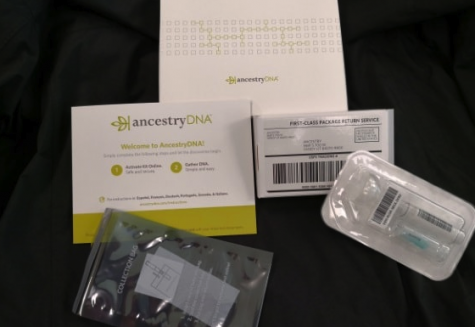DNA Kits: What you should know before you buy
You can find most of these at-home DNA kits in the aisles of stores. These 23andMe kits were found on an aisle end cap at Target.
Lately, DNA test kits are everywhere. If you haven’t taken one, chances are someone you know has. What are they and why are they exploding in popularity now? People’s desire to know who their ancestors were and what their DNA contains drive sales in this niche market. These at-home genetic tests can now be purchased at stores everywhere under brand names like 23andMe, Ancestry DNA, and MyHeritage to name a few.
Logan Jesperson recently ordered a kit from 23andMe. He stated, “My mom and I ordered it as a package, I got it to find out if we are actually part Native American, I’m hoping I have enough Native American ancestry to get some scholarship money.”
23andMe, one of the most prominent in the business has sold kits at stores since 2015 after it was approved by the FDA. Like most kits available to the public in the kit, it uses your spit. After filling the included tube, you send it in for testing. After 2-4 weeks of anticipation, you can check your results on their website. The basic test results include your ancestry percentage from +1000 different regions. If you opt for a more expensive kit it will include more comprehensive DNA analysis, including genetic health risks, carrier status for inherited diseases, and other more specific traits.

These results might seem like they were pulled out of thin air, however, most of them are rooted in genetic science, with a few exceptions. To understand how these companies turn you spit into a map of your heritage, you need to understand a little bit about DNA. Here is a quick review of DNA from that biology class Sophomore year that you probably slept through.
A Quick Review From Biology
- Like an instruction book folded up inside each of your cells
- Tells your cells how to develop, survive, and function
- It is made up of four letters G(uanine), A(denine), T(hymine), C(ytosine) that form 3 billion pairs in each cell.
- It is completely unique to you, no one shares the same exact sequence as you
- Some estimate that you have around 6 ft of DNA in each of your cells, and you have around 30 trillion cells in your body
With those kinds of numbers, similarity might seem hard to come by. Even though the person sitting next to you might seem completely different than you, their DNA is only 0.01% different. When these companies get your spit in the mail they look at that 0.01% for the results. Inside that small fraction of your genome is where the answers to your ancestry lie.
These small differences are called Single Nucleotide Polymorphisms (SNPs) which is just fancy name for the parts of your genome that vary from person to person. To give you results company take huge archives of genetic data and relate it to your spit. Companies obtain the genome of certain groups of people and build a database for later. If a certain population in Mongolia has a lot of similar SNPs as you the company finds your relation to that sample group.
Unlike other popular kits, 23andMe is lauded for its health risk info. They identify SNPs and differences linked to health risk and genetic diseases. One SNP some kits look for is the BRCA gene which certain variants are linked to higher breast cancer rates. Right now they are the only genetic kit approved to make these claims by the FDA. If you’re looking for more of a comprehensive test that details certain health risks 23andMe is most likely your best source.
With these companies touting incredible predictions all from a vial of spit, the question lingers, is this just another pseudoscience trying to profit off the common people? Most of your results have backing from the scientific community, however, some obscure tests have been questioned on their efficacy. One such test is the “Superhero DNA Test” which tests for “intelligence, speed, and strength” however it failed to identify when someone sent in golden retriever spit instead of human spit.
“Ancestry tests are trying to give people a simple answer to what chances are was a much more complex past,” says Sheldon Krimsky, Lenore Stern Professor of Humanities and Social Sciences in a Tufts News article.
You should avoid kits that bolster crazy claims that aren’t determined by your genes. Factors outside of your genes usually contribute more to your intelligence or other similar traits. If possible, you should research how many SNPs the kit tests for. The Superhero DNA Test only tests for four whereas 23andMe tests for tens of thousands of variants. The more SNPs they test for the more data they have to compare which means it will be more accurate. You should also keep in mind that the health risks shown in your results are not a diagnosis. Other factors like your environment and unique lifestyle play a big part.
A lot of news about DNA tests is positive, however, there are still some concerns. Most people are worried about where their data is kept. Unless the company’s legal forms say otherwise you should assume your DNA and even your spit sample are held indefinitely. Your genetic data, what they gather from your DNA, is usually sold and used in research projects. In the same article, Krimsky stated around 50 percent of companies sell your genetic information. Some companies give you a chance to opt out, but for many, this is a huge source of profit. The companies usually promise a layer of anonymity between you and your data, but sometimes that isn’t enough to keep your identity separate from your data. There have been a few cases where people took anonymous data and found the name connected to it.
One of the more famous cases is the Golden State Killer Suspect. Although it was great news for the case and the victims, it opened some concerns about privacy. Police sent the DNA they found to a genetic ancestry program. When they got the results they found some relatives of the suspect and arrested him. This is just one case, but it highlights some of the risk associated with these tests.
However, for most people, these kits offer a glimpse into their often complex ancestry. As our culture quickly becomes more global and blended, it’s hard to remember where you came from.

Hey guys, I'm a senior here and this is my second year in journalism so I'm basically a pro now. If you're looking for me you can usually find me asleep...









